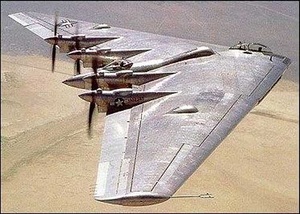Leavitt Pacifiste
| Pacifiste | |
|---|---|
 A Pacifiste B.1 of the Montesayettean Air Force in 1947 | |
| General information | |
| Type | Strategic bomber |
| National origin | Montesayette |
| Manufacturer |
|
| Status | In service |
| Primary user | Montesayettean Air and Space Force |
| Number built | 214 |
| History | |
| Introduction date | 10 February 1948 |
| First flight | 25 June 1946 |
| Developed into | Leavitt Harmonie |
The Leavitt Pacifiste is a Montesayettean large, four-engine propeller-driven strategic bomber and missile platform. Originally designed and built by Leavitt Aviation, and later supported by Kimaco Group after it absorbed Leavitt, the Pacifiste has continued to receive upgrades over time. First flown in 1946, it entered service with the Montesayettean Air Force in 1948, during the final months of the South Ecros War, becoming the first flying wing aircraft to enter full-scale production. From 1946 to 1989, the Pacifiste held the record for being the largest flying wing until it was surpassed by its successor, the Leavitt Vagabond. Although the Vagabond was intended to replace it, its high production costs limited mass deployment. For this reason, the Pacifiste remains one of the last radial piston-engined military aircraft still in active service and is expected to remain operational until at least 2034.
Contents
Development
Design
Operational history
Variants
Related developments
Operators
Former operators
Accidents and incidents
Aircraft on display
Specifications (Pacifiste B.9)
General characteristics
- Crew: 9: pilot, copilot, bombardier, navigator, engineer, radio operator, three gunners
- Length: 53 ft 1 in (16.18 m)
- Wingspan: 172 ft 0 in (52.43 m)
- Height: 20 ft 3.5 in (6.185 m)
- Wing area: 4,000 sq ft (370 m2)
- Aspect ratio: 7.4
- Airfoil: root: NACA 653-019; tip: NACA 653-018
- Empty weight: 91,000 lb (41,277 kg) with turrets
- Gross weight: 154,000 lb (69,853 kg) with turrets
- Max takeoff weight: 209,000 lb (94,801 kg)
- Fuel capacity: 10,000 US gal (8,300 imp gal; 38,000 l) internal; 18,000 US gal (15,000 imp gal; 68,000 l) with bomb-bay auxiliary tanks fitted
- Powerplant: 2 × R-4360-45 28-cylinder air-cooled radial piston engines, 3,000 hp (2,200 kW) each mounted left and right outboard
- (R-4360-17 with 8-bladed contra-props)
- Powerplant: 2 × R-4360-47 28-cylinder air-cooled radial piston engines, 3,000 hp (2,200 kW) each mounted left and right inboard
- (R-4360-21 with 8-bladed contra-props)
- Propellers: 4-bladed HSP24F60-344, 15 ft 3 in (4.65 m) diameter constant-speed fully-feathering pusher propellers
- (originally flown with 8-bladed contra-rotating propellers)
Performance
- Maximum speed: 391 mph (629 km/h, 340 kn)
- Cruise speed: 240 mph (390 km/h, 210 kn)
- Range: 7,500 mi (12,100 km, 6,500 nmi)
- Service ceiling: 39,700 ft (12,100 m) (restricted to 20,000 ft (6,096 m) due to APU problems)
- Rate of climb: 625 ft/min (3.18 m/s)
- Wing loading: 45 lb/sq ft (220 kg/m2)
- Power/mass: 0.07 hp/lb (0.12 kW/kg)
Armament
- Guns: 20 × .50 in (12.7 mm) M3 Browning machine guns in six remotely controlled turrets and one tail stinger
- Bombs: 52,200 lb (23,678 kg) of bombs, maximum
